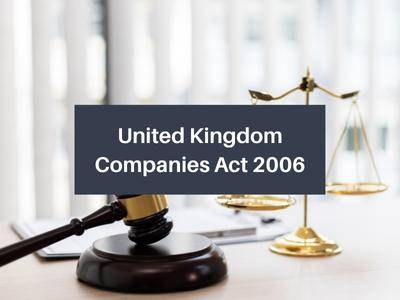United Kingdom Companies Act 2006
 3E Accounting takes a look at the United Kingdom Companies Act 2006 for a bird’s eye view of company law.
3E Accounting takes a look at the United Kingdom Companies Act 2006 for a bird’s eye view of company law.
The United Kingdom Companies Act 2006 governs all legal matters pertaining to companies in the United Kingdom. It is considered the principal source of company law and has been phased in its rollout and application. The latest provision came into force in 2009 and has been instrumental in keeping the law abreast with global changes. While considered comprehensive, it is nevertheless an essential piece of legislation.
The Legalities of Company Law
The Companies Act 2006 (the Act) is a codified source of law that governs the legalities of companies in the United Kingdom. It has collated most of the common law sources pertaining to companies and has its roots in the mid-nineteenth century.
Regulation of commerce was based on private law, but this changed with the rise of the British mercantile empire. Further impetus came with the Industrial Revolution, the Joint Stock Companies Act 1844 and the Limited Liability Act 1855. These saw the concepts of company incorporation, separate legal identity and limited liability being legalised.
Consequently, business entities became all-powerful, and this led to questions on corporate governance and accountability. To address this and other issues, the Companies Act 1948 was passed by Parliament. The law continued to evolve, and the Companies Act 2006 set the bar for codification. The Act streamlined company legislation, making it more current and flexible enough to implement future changes.
The Act, in its entirety, can be accessed on the United Kingdom Government website as well as the Companies House website. Some of the highlights of the regulations under the Act, as amended and implemented, include the following:
- Unification of legislation for the United Kingdom with regards to company law.
- Codification of certain directors’ duties which were previously only found under common law principles.
- Streamlined registration and incorporation of companies, especially in relation to facilitating online submissions.
- A more inclusive accounting and reporting standard to be observed by small businesses.
- A comprehensive upgrade to rules pertaining to naming a company.
- Implemented a broader scope of shareholder rights and accountability while simplifying share capital regulations.
- Far-reaching changes in limited companies’ requirement. These include not requiring a company secretary, allowing the use of registered or service address, using model Articles of Association which also form the constitution of the company, etc. Private limited companies will also no longer be required to hold annual general meetings or AGMs.
Having a sound understanding of the United Kingdom Companies Act 2006 will ensure that your business does not run afoul of the regulations. After all, ignorance of the law is no excuse. If you want to know more about the Act’s rules and regulations, Contact 3E Accounting today. Our team of experts will ensure that you are conversant with the crucial points of the law. Conversely, 3E Accounting can ensure your business is up to mark with compliance. We provide innovative and customisable business solutions ranging from company formation to forensic audits. Get in touch with 3E Accounting to work with the global experts of bespoke business solutions.

